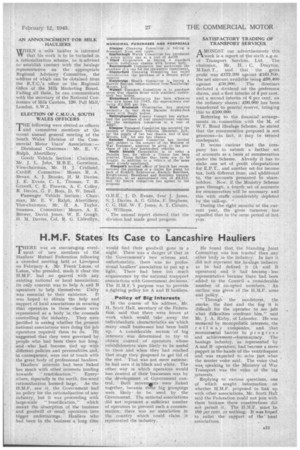H.M.F. States Its Case to Lancashire Hauliers
Page 23

If you've noticed an error in this article please click here to report it so we can fix it.
THERE was an encouraging. enrol ment of new members of the Hauliers' Mutual Federation following a crowded meeting held at Liverpool on February 9. Mr. Frank 'Lucas, of Luton, 'Who presided, made it clear the H.M.F. had no quarrel with any existing national or local bssociation: its only conceit was to help A and B operators to help themselves.. Unity was essential to their existence. .1t was hoped to obtain the hop and support of local associations in securing that operators in these classes were represented as a body in the counsels controlling the industry. They were justified in asking Whether the present national associations were doing the job operatorsrequired them to do. He suggested that they were governed by people who had been there too long, and who had become. tied up with different policies and personalities and, in consequence, were out of touch with the great body of professional hauliers.
Hauliers' interests had been linked too much with other interests tending
towards " frustification." Every,. where, especially in the north, the word rationalization loomed large. As the
saw it, the Government had no policy for the rationalization of any industry, but it was proceeding with
large-scale " trustification," . which meant the absorption of the business and goodwill of small operators into bigger undertakings. Hauliers who had been in the business a long time
would find their goodwill gone, in a night. There was a danger ef that in the Government's new scheme and, unfortunafely, there was no professional hauliers' association to put up a fight. There had been too much acquiescence by the national transport associations with Government decisions.
The purpose was 'to provide alighting policy for A and B hanliers.
Policy of Big interests
In the course of his address,. Mr. H. Scott Hall, secretary of the Federation, said that there were forces at work which would takeaway the individualistic characteristic-s on which many small businesses had been built up. A considerable section 'of big interests was detenniued to try to obtain control of operators whose establishments were likely to be useful to them and when they had reached that stage they proposed to get rid of the rest. That was not mere surmise; he had seen it in black and white. The other way in which operatOrs would lose control of their businesses was by the development of Government control. Both moverripts were linked together, because th7se big groupings were likely to be used by the Governm-ent. The national associations did not represent a sufficient number of operators to prevent such a consummation; there was no association in the country which could claim it represented the industry.. .
He found that. the Standing Joint Committee was less trusted than any other body in the industry. In fact it did( not represent-the haulage industry as he had defined ii (A and 13 operators) and it had become less representative because there had been added to the Council a considerable number of co-opted members: An outline was given of the H.M.F. aims and policy.
" Through the sandstorm, the smoke, the dust and the fog it is difficult for the operator to see jukt what difficulties confront him," said Mr, J. A. Kirby, of Leicester. He was menaced by monopolistic interests, the railway companies, and that monumental barrier to progress , and achievement.--ebureaucracy. The haulage industry„ as represented by A and B operators; had become a mere puppet in the hands of the ventriloquist and was expected to echo just what .. the master yoke said. The voice that was, speaking to the Ministry of War Transport was the voice of the big interests.
Replying to various questions, one of Which sought information on whether H.M.F. proposed to link up with other associations, Mr. Scott Hall said the Federation could not join with them because there constitutions did not permit it. The H.M.F. must be 100 per cent, or nothing.. It was hoped to . enlist the support of the' icical associations.




























































